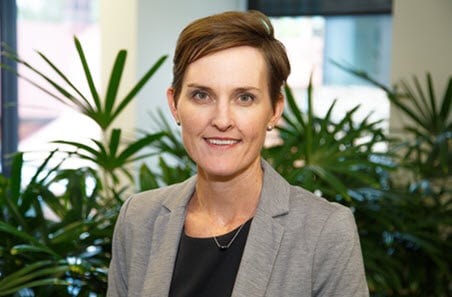A sustainability story

Creating a sustainability plan for your business shouldn’t be a daunting task
According to Dalene Wray, Managing Director of OBE Organic, Australia’s oldest organic beef exporter, the process can generate commercial benefits and showcase a company’s commitment to environmental stewardship, improving animal welfare and meeting community and consumer expectations.
“We launched our sustainability program, FLOURISH, in 2016. It provides a framework of expectations and capabilities that the company and many of our producer suppliers subscribe to,” she said.
“The formative process was rewarding. It enabled us to not only plan pathways to what we wanted to achieve, but to identify risks and opportunities.”
Dalene said OBE’s sustainability plan, which underpins FLOURISH, was a practical, user-friendly road map for the company.
“OBE was started by, and is still owned by, producers who want to do things well,” she said.
Dalene (pictured) said OBE Organic was motivated to create a sustainability plan because of the growing interest from customers in the story behind the beef.
“Some customers are motivated purely by price and reliability of supply, but a growing number are mindful of sustainability and want reassurance that OBE Organic and its suppliers are too,” she said.
“I think sustainability plans and assurance will become more commonplace. A good example is the Tokyo 2020 Olympics, where all food supplied to the athletes’ village must have sustainability certification.”
Setting the foundations
OBE Organic’s FLOURISH has four pillars: environment, animals, people and product. It uses Grazing BMP, a best management practice, self-assessment tool designed for the Queensland grazing industry as the basis for encouraging producers to improve environmental, animal and people management.
“We were Grazing BMP’s first corporate partner in 2015, and its modules cover most of our sustainability plan priorities, such as farm safety, animal welfare and environmental management,” Dalene said.
“The fact it is an online, self-assessment tool also means it is a practical, time-efficient way for producers to improve their skills and knowledge and, for our sustainability plan, to demonstrate their capability. We see it as a win–win.”
Regular reviews of the sustainability plan by all OBE staff help them find new opportunities and keep activities focused. For example, when discussing how to reduce waste, staff identified lost on-farm productivity as a source of waste and identified existing processing data as a possible tool to turn that situation around.
As a result, OBE Organic co-invested with MLA Donor Company to create a processing data feedback loop to help producers quantify herd health and wellbeing and identify areas for improvement.
DIY plan tips
Dalene Wray said businesses interested in creating their own sustainability plans should not be daunted by the process. Here are her recommendations for that journey.
Why have a plan?
- It requires you to look at your business from the point of view of people who can help or hinder you, and that helps identify risks and opportunities.
- Beef is a great story, and a sustainability plan allows you to share it with the wider community including chefs, food influencers and mindful consumers.
- It shows your capability to deliver sustainable produce.
Tips for creating your plan
- The MLA-supported Australian Beef Sustainability Framework tool is a good starting point. Build on its four themes of animal welfare, environmental stewardship, economic resilience and people.
- Think about who your business affects – employees, customers and regulators – and consider viewpoints from outside the business.
- Consider what you should be doing; sustainability at heart is about strategic planning, combining best practice management with end goals.
- Don’t make it too complex. Start with the things you do well, and the most important things you need to improve, and work on those.
- Enjoy the journey. A sustainability plan shouldn’t be too rigorous or onerous, it should be a way of finding win–win situations for the entire value chain.
- There are plenty of online tools and templates to get you started.
It's a RAP
During the process of creating OBE Organic’s sustainability plan, the company recognised it could take the company’s commitment to model citizenship further, by creating a Reconciliation Action Plan (RAP).
“I grew up in Birdsville, outback Queensland, a small community with many Indigenous residents and I wanted to recognise their contribution to pastoral Australia,” Dalene said.
“A Reconciliation Action Plan was the obvious thing for us to do and I hope we can influence other agribusinesses to do the same.”
Dalene said the RAP encourages greater recognition and respect for the role Indigenous Australians have in agriculture and strives to improve understanding of their culture, history and achievements.
Dalene said businesses wanting their own RAP should consider using the template provided by Reconciliation Australia at reconciliation.org.au/reconciliation-action-plans/
More information
OBE Organic Managing Director Dalene Wray
Email Dalene Wray
obeorganic.com



